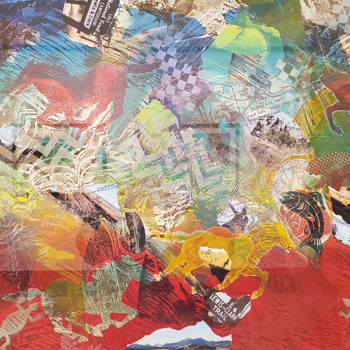The Hibernating Homunculus
 Artwork by DALL·E
Artwork by DALL·E
My mind is blurry when I write. What is writing, where does it go, I do not know. I sit when I write, that much I can confirm. But prolonged bouts of sitting are not always desirable. I slouch as my brain drains itself of blood. My breath runs weak, crooked and reaches all the wrong crevices. My balls get sore and my thighs chafe.I wiggle a toe or two. How futile my legs feel tucked under a blanket. Warm and numb, though sometimes buzzing in place, with nowhere to go. My legs are hidden when I write. Out of sight but not out of mind. My legs have nowhere to head. My body is without direction. My words must lead instead.
Philosophy is often compared to walking. Like exploring an unfamiliar neighbourhood, one seeks knowledge cautiously, in the liminal experience of trying not to get lost. Philosophy is a passage without beginning or end, a medium, a meditation. Philosophy happens in limbo. But to get to limbo, one needs a vehicle, if not legs. Some way to move.
I hate to strain my legs, so I am at best an ex-philosopher. The protagonist in Mitski’s “Dan the Dancer,” on the other hand, is a philosopher who has “very long legs from leading day to day.” For the longest time I misheard Mitski. I assumed that Dan preferred to lean, not lead. Leaning is familiar to me. I want to take you on a journey, but I will admit that I prefer sitting to walking, leaning to leading.
While I mistakenly sought comfort in Mitski’s love for the lanky and clumsy Dan, the “real” Dan spent his days leading, with long legs. He who relies on his own two feet has no need for the prosthesis of writing. Dan needed no vehicle. But I remain seated. I use my legs in private only. Surely there is something alluring about that. Mitski herself prefers to sing about how Dan dances in the bedroom. The rest of us are not privy to Dan’s bedroom dance, but Mitski is, and she turns his dance into a song.
Just as Mitski revels in the most private use of Dan’s legs, I undertake my greatest philosophical journey confined at home. Unlike those philosophers who take us on a stroll, I have a penchant for losing myself without moving an inch. When my mind goes on a hike, I prefer leaning. This preference is not always a choice.
This preference is also not purely intellectual. I sit because my legs are long and lanky and not compact enough for planes, trains, and automobiles. Over time, my legs have buckled under the pressure of inactivity. Prolonged bouts of sitting yield short hamstrings. Where my legs end, the upper half of my body houses stress and a bad back. My lungs, slowly crumbling under the catastrophic smog of Delhi, fail to rejuvenate my limbs. A winding gait completes the picture.
I obsess with leaning because I have no alternative (or so I feel) and because I stay awake until my body forces itself to shut down. I (or rather, my body) choose sleep only when there is no alternative, even (or especially) in the face of my mind’s adamant refusal.
All this leaning, reclining, sitting, squatting, bending, and buckling has consequences. At this point, I cannot fathom being another way. I cannot fathom not leaning. The cycle is vicious.
If and when I do in fact stand, my two legs still need a third, a foothold, an invisible prosthesis. Losing this foothold is like falling into a state of disorganization from which there can be no return. One cannot return because one has lost oneself.
In Clarice Lispector’s The Passions of G.H., G.H. likens losing her sense of self to losing an invisible foot. What happened to G.H.? She merely entered a room in her own penthouse apartment. The room had until recently been in the care of an unnamed maid. But the maid is gone and G.H. must walk into her old room to clear the air. As she walks, G.H. anticipates a damp, dusty, grimy pile of overlooked and/or discarded objects.
What she finds, however, hurts her sensibilities all the more. A big white room. Maybe not a very big room, but a room that elongates in every direction because it is so empty, dry and sterile. Here G.H. meets the edges of conscious life—a squashed, dying cockroach—and loses herself. This brush with the inorganic is irreversible. She is no longer herself.
G.H. can hardly relay what has happened. This is the point at which the journey begins. Not as she walks towards the room. Nor even as she opens the door. G.H.’s story begins after she is lost in the haze of a new, unfamiliar world, post-encounter, in an unfathomable place, when reflecting on the past is necessary, but narration remains impossible. To live/move on, one would have to recollect the most intimate, earth-shattering events.
One’s past is always somewhat at a remove, but G. H’s experiences feel singularly irretrievable. Revolted by the squashed, not-yet death cockroach, G.H. does not want to remember. But insofar as she must recollect her revulsion, she has also developed an incurable taste, for the putrid, the obscene, and the seemingly inert.
The real journey is not the walk, but the encounter which paralyzes G.H., leaving her immobile even as she was ripped apart and sent away from herself, thrown out of orbit, seeking an impossible center that is long-gone—alienated. An astounding and immense journey; the consequence of a quick pace.
I too have been in a disorganized, shell-shocked state. I have walked those liminal pathways that require little to no physical movement. The passages left me internally discombobulated, with little authority to speak on matters of the past. I, who once embodied the curved, reptilian posture of a writer, have tasted the inorganic, and no longer know who/what I am, what “writing” is or what it means to be a “writer.” Nonetheless, I pick up the pieces by writing. In echoes, I gather the semblance of a self that is not me, not a self I have known, but a thing that can be recognized as a self.
In doing so, I offer an impossible testimony. I simulate “living on” through a phantom sociality. Is fictitious recollection not the quintessential experience of writing? In writing, the past is legible only through (or around) a blind spot, from behind a veil.
Writing is not only ghostly, but fugitive. Like a floating signifier, it risks flying away. Language’s tributaries are never encapsulated, never traversed in their entirety. A bridge of indeterminate length without beginning or end, writing insinuates itself anywhere and everywhere, and fades in its own right. Just as I, by fading, ignore the limitations of my own two legs, writing disguises its true limits by vanishing.
Why is there, amidst writers, this great concern for another time? Why entertain the notion and fancy of time spent not writing? The Slovenian philosopher Slavoj Zizek, for example, celebrates the great comfort of not writing. Despite being a prolific writer, he claims to have never written a single world. Writing happens, but he does not write.
A writer who claims he does not write. How might writing vanish from the scene of its own production?
Writing hides itself by the hands that etches, sketches, and most importantly, sculpts. Sculpting, like any of the more physical arts, is exhausting. But writing is equally exhausting, debilitating, and paranoia-inducing because it is in-itself empty, devoid of its own substance. One must write about something, perhaps that is why the written word turns its gaze outside of itself. Lispector’s G.H. is herself an established, middle-aged sculptor, and it is fascinating that Lispector writes from the perspective of a sculptor. Though G.H. the sculptor has no words to recollect what happened, Lispector the author finds this lapse and this need to recollect generative. Where there is nothing, Lispector will try to fertilize shit. Like G.H., Lispector is obsessed with the inorganic and the disposed (not to mention the indisposed).
I aim to walk in Lispector’s footsteps. From an arid, parched zone, a writer should shit on a page. I begin “writing” by taking a big fat dump. At a later date, I return to the scene of the crime and begin sculpting. I sculpt wispy clay that aspires in vain to leave behind the most indelible stench. By the end of this process, I have shred at least a few pages. Writing has happened, but I have only sculpted shit. I am yet to “write” a single word.
If you would like to follow along, do not write. Not in a programmatic sense, at least. Instead, become a sculptor obsessed with style. Leave shit on the page and let another version of you sculpt the remains.
Don’t generate words. You have plenty to say. Remove the ones you don’t need. If you’re inspired, stuff will fall off the easel. If you are diligent, structure will take care of itself.
Like people, a written text must take off at least one article of clothing. If you hesitate, remind yourself that you stand at an edge. Even the most intimate expression, uttered in the deepest solitude, becomes foreign once etched on paper. You are not your words, for words are mere playthings, fetishes to fiddle with, but fundamentally not who you are. Your words, when written, become foreign to your own tongue; that is what it means to write.
You may incinerate your writing, but if writing has happened to you, then your words split from you. The game is not easy. Like flushing a toilet, you leave your shit behind, and your shit is now someone else’s, something else’s. If that sounds chaotic, then remember to call this chaos a writer’s grace. One writes from a well of alienation that is not only painful (which is unfortunate) but endless (for which I am thankful).
As long you are around, you are never without longing and solitude, your interminable abyss. May this lighten your heart or fill you with dread. Of that I have little control. In either case, I am sorry for what remains and for what is yet to come.
If you want to write, remember, you do not have to walk. You will find that you are moving nonetheless.




